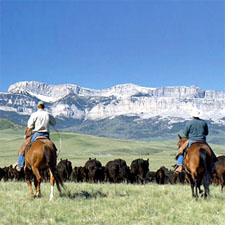Dryness and Desperate Measures: The Implications of Land Tenure on Rocky Mountain Ranchers' Drought Experiences and Behaviors
Ranchers in the Rocky Mountain West navigate a complex land-tenure system comprised of deeded, leased, and public grazing lands. Droughts create management challenges for ranchers across their land holdings and impose physical, social, and economic impacts on the ranching system. However, while some studies have explored western ranchers’ drought experiences and management strategies, none have looked specifically at the role land tenure plays in their drought responses, and most literature on the relationship between land tenure and drought has thus far focused outside the United States. The goal of this Western Water Assessment-funded study by graduate student Kristin Gangwer, supervised by Bill Travis, was to explore the implications of land tenure on ranchers’ drought coping behaviors and adaptive capacity. What adjustments and adaptations do ranchers deploy to cope with drought? How do ranchers’ drought experiences and management strategies differ across land holdings? What role do institutions play? And what factors influence the future adaptability of the system, particularly to potential climate change?

